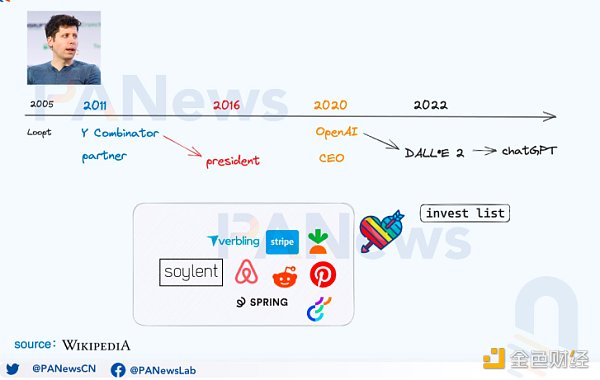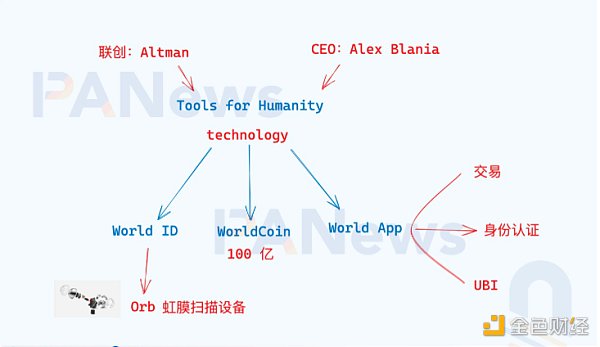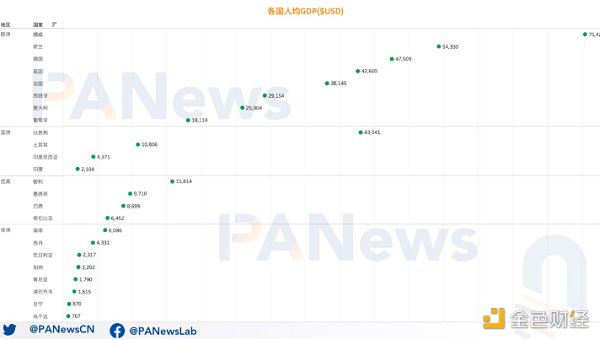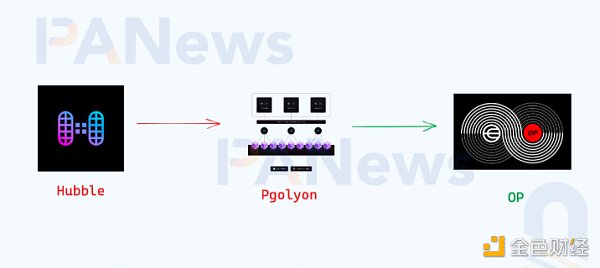Can the fluctuating UBI economy of the Worldcoin AI era become a reality?
Can Worldcoin AI's fluctuating UBI economy be realized?Worldcoin has recently gained popularity again. On the one hand, the AI celebrity and OpenAI CEO Sam Altman has a close relationship with it. On the other hand, Worldcoin announced plans for another $100 million financing plan. According to BlockingNews, this round of financing has been highly sought after by institutions and has already been oversubscribed. It is a great opportunity in a bear market environment.
Before this, a16z had led the investment of $100 million for the token financing of Worldcoin at a valuation of $3 billion. Worldcoin is now facing the moment of token issuance. The use of the confirmed 20% share has been allocated, 10% to team members and another 10% to investors.
Origin: The Challenge of Web 3 and Altman’s UBI Dream
In 2019, Altman initially proposed the idea of Worldcoin as an ID project, but in fact, Alex Blania of the California Institute of Technology is the CEO who oversees its daily operations, and Altman is its co-founder, with the focus of daily work still on OpenAI.
Overall, however, both can be considered as the main operators of Worldcoin, because from the beginning, Worldcoin has taken on the important task of popularizing Web 3 globally. This is also an important reason why it can walk hand in hand with AI. In a sense, Web 3 can only truly achieve Altman’s ultimate dream of UBI when combined with AI.
- Vertex Labs acquires Digimental Studio, the developer of HAPE PRIME, for $12 million
- Introduction to Cascade: The First Interchain SVM Rollup Supporting IBC
- OP Labs: Multiproofs Design in OP Stack and Their Impact on the Ecosystem
In early 2020, the COVID-19 pandemic spread worldwide. Basically, the governments of Europe and the United States adopted quantitative easing policies and actively distributed consumer vouchers, subsidies, and even cash to stabilize society. Altman’s UBI idea also found allies. Around early 2020, Alex Blania and Sam Altman hit it off, “What if there was a way to distribute digital token shares for free to everyone on earth?”
The epidemic is the real catalyst for UBI, which has led to large-scale practical applications of UBI in the social sector. It has also guided Altman’s path choices. He also disclosed in his blog that he hopes to use AI technology to conduct research related to combating the epidemic.
And the use of hardware device areas to ensure the authenticity and trustworthiness of the ID is gradually taking shape. “There is also a point where you need to be physically connected to this world, so you need hardware or a real ID,” which is also the theoretical source of the iris scanning device Orb.
From this timeline, Altman almost simultaneously determined the technical route of Open AI and Worldcoin, namely the LLM large model scheme in the AI field and the hardware + ID route in the cryptocurrency field. Later, he led Open AI, and Worldcoin was actually operated by Alex Blania.
This is also more in line with Altman’s personal style in the investment field and actual enterprise operation, that is, when he actually operates a company, the investment business will continue to expand, but the actual operation of other companies will be led by others, and there will be fewer cases where Musk serves as the actual operator of multiple companies.
 The combination of Crypto + AI
The combination of Crypto + AI
LLM is a victory in terms of the number of parameters, and its power has conquered the world. However, the path of popularizing cryptocurrencies has not been proven, but cryptocurrencies do face the same early and important dilemma as AI-lack of users and scenarios, and few users have little to do besides trading.
Regarding this issue, Worldcoin CEO Alex Blania’s view is that “giving everyone ownership of this new protocol will be the” fastest “and” most popular “way for cryptocurrencies and Web3 to become popular so far, and it will be possible to solve one of the main challenges of Web3: relatively scarce users. “
However, the logic of Crypto still needs time to verify. Applied to specific product design, Worldcoin is developed by Tools For Humanity. Its products will be divided into three parts:
-
World ID: Orb scans the iris to establish personal identity;
-
Worldcoin: Built on the OP super chain, the token will play an economic role on it;
-
Woeld App: Built-in transaction, identity recognition and UBI specific economic functions, hoping to precipitate Web 2 users here.
The introduction of Worldcoin articles has been numerous, and this article is not about the specific details of the product, but about revealing its underlying logic and the details of Worldcoin products.

The productivity of the AI era will result in redundant social wealth. In Altman’s 2021 article, he believes that the wealth created by AI will be sufficient to meet the needs of everyone. He predicts that by 2031, AI can pay every American $13,500 a year.
After the successful development of ChatGPT technology, the goal seems to be within reach. The problem now becomes how to ensure the orderly distribution of wealth, which requires confirming personal identity. In order to prevent common “witch” attacks represented by impersonation, the DID from off-chain also becomes a necessity.
Proof of identity becomes a basic prerequisite for personal participation in the distribution of public welfare in the UBI era.
The Middle Way: Aborted and Hidden Dangers
Similar to the P2E and other Web3 native economic models, Worldcoin experienced a steady increase in users during 2021-2022, but also encountered privacy dilemmas, paid promotion and other public opinion whirlpools, and even faced a shutdown at one point.
However, benefited from the explosion of ChatGPT, the current registration number of the World App has exceeded 1.7 million, while the number of users did not exceed 1 million until the end of 2022. But it should be pointed out that the number of app registrations and the number of people who accept iris scanning are not the same. According to data from March 2023, CEO Alex Blania disclosed that only 450,000 people from 24 countries had completed full biological data collection.
Privacy dilemmas are not completely resolved
According to its description, the data scanned by Orb will not be stored and maliciously utilized by Worldcoin, and ZK technology will be gradually adopted to provide higher-intensity security protection. However, in some regions, its operating contractors will adopt reward measures to encourage local residents to submit data, so users will be required to provide proof of identity to prevent duplicate claims.
And data trading has already appeared. According to the company’s spokesperson, there has been a phenomenon of collecting local villagers’ irises in Southeast Asia and selling personal encrypted users for $30 or less to help complete app registrations, and the motivation behind this is the possible token airdrop that may come.
What’s worse is the contradiction between regulatory intervention and data processing.
Worldcoin has a registered subsidiary in Germany, and according to the principles of the GDPR regulations, any data that operates or involves EU residents is subject to EU regulation. However, the global operation of Worldcoin is actually in conflict with EU regulations. For example, it claims that 1% of the population in Portugal has become its users, and how to handle global data has not been adequately explained. According to GDPR regulations, “failure to adequately protect data can result in fines of up to 4% of global revenue or €20 million.”
Next is the hidden issue of “digital exploitation” of the third world. Due to the regulatory policies of various countries, residents of countries such as China and the United States can register their App, but cannot be authenticated through World ID. According to official data, most of the registered users of Worldcoin are in poor countries, such as Africa and Latin America. Currently, 24 countries and regions are participating in its testing, of which 14 are developing countries and 8 are located in Africa. The specific distribution and per capita GDP are as follows:
-
Africa: Benin, Ghana, Nigeria, South Africa, Sudan, Zimbabwe, Kenya, and Uganda;
-
Latin America: Brazil, Chile, Colombia, Mexico;
-
Europe: France, Germany, Italy, Netherlands, Portugal, Spain, UK, Norway;
-
Asia: India, Indonesia, Israel, Turkey

In early May, it was already hacked and some passwords were leaked. Although its distributor did not take good confidentiality measures, if the data before being put on the chain cannot be guaranteed, the privacy of the data after being put on the chain will also be discounted.
Not only is the hardware device prone to problems, but its underlying architecture has also undergone multiple changes and does not seem to be a completely self-developed project.
Multiple changes to underlying architecture technology
Although Worldcoin aspires to be the first encryption project for global users, not all of its technologies are self-developed, but are stacked based on existing mature technologies to avoid scattered focus and focus on identity recognition and operators.
As an example of the underlying architecture, Worldcoin chose to cooperate with mature existing products. In the early stages of the project, it was Hubble, but it was mainly used in payment scenarios and could no longer meet the demand in the later stage. It then switched to Polygon, but as Worldcoin carried more scenarios, it finally turned to the super-chain architecture of Optimism. Worldcoin had already contacted Optimism and other Layer2 in 2020, but it was not until their solutions matured that they truly began to cooperate.

In some ways, Worldcoin does not have many innovative features in terms of cryptocurrency. Rather, it focuses more on outreach and acquiring users, with a real concern for how to combine existing technology to bring billions of people worldwide into the Web 3 space.
In its plan last year, it had planned to use ZKP technology for offline identity verification, which it called PPPoPP (Privacy-Preserving Proof-of-Personhood Protocol). This was mainly done by performing ZK calculations on offline information and then uploading it to the chain to meet the need for privacy protection. However, at that time, it still used the Hubble solution, and after switching to the super chain, its data throughput can be further increased and Gas Fee usage reduced.
Furthermore, after collecting data, ZK-protected data can be used for machine learning via the ZKML scheme without infringing on personal privacy, in order to explore more usage scenarios using the collected data.
To summarize, in Worldcoin’s plan, encryption technology, ZKP, and AI technology are not mutually exclusive options, but rather the next generation of network technology that can be combined with each other. All of this depends on there being enough users to generate enough user data to enrich the usage scenarios of tokens and ultimately support the progress of productivity to meet the operational needs of UBI.
Conclusion : Is UBI worthwhile?
Unlike the rapid progress of AI, UBI and cryptocurrency still face many questions, especially whether the use of cryptocurrency as a method of popularizing UBI can be effective, which is still an unsolvable problem.
The logic of UBI is not complicated. The total production of human society is currently greater than the total demand, but due to inequality, there is widespread inequality between poor and rich countries, high-income and low-income groups, and even between men and women and generations. The idea of UBI is to redistribute social wealth in a milder way.
For example, ImBlockingctMarket on Celo has already attempted to provide financial and educational services to residents of third world countries, using Crypto UBI to improve their livelihoods and living standards.
UBI does not need to forcefully change the current distribution relationship, but rather to give everyone equal access through new token issuance. Similarly, Chinese economist Zhai Dongsheng has also envisioned a Chinese version of UBI – “A Preliminary Study of a New Redistribution Plan for the Era of Common Prosperity, Starting Income in the Future,” in which “the central government provides funding support in the form of digital currency to Chinese residents aged 0-35 using domestic debt and tax revenue as sources of funds, and provides one-time education or skills training assistance to Chinese residents over the age of 35.”
Whether successful or not, Worldcoin will be the first large-scale UBI experiment aimed at all of humanity, previous attempts in general did not receive widespread attention. For example, Circles, which belongs to the UBI category, currently has fewer than a thousand people participating in governance on a regular basis and remains a small-scale experiment.
With the help of cryptocurrency and Worldcoin, this will be the first attempt to face millions, if not hundreds of millions, of ordinary users worldwide, most of whom were not previously Web 3 users. From this perspective, at least in terms of popularizing cryptocurrency, it has taken a step towards true mass popularity.
We will continue to update Blocking; if you have any questions or suggestions, please contact us!
Was this article helpful?
93 out of 132 found this helpful
Related articles
- Blend will support the KanBlockingi Blockingndas and Redacted Remilio Babies NFT series.
- Principles of Natural Philosophy for Petting Fur
- How to maintain liquidity in protocols? A quick look at the time-bound token protocol Hourglass
- Smart contracts, breaking away from the regulations of civil law contracts?
- Hardcore Analysis: Key Factors and Specific Investment Directions for Large-scale Adoption of DID in the Future
- Vitalik’s new article: Keep On-Chain Minimalism, Don’t Overload Ethereum Consensus
- Amid the cryptocurrency winter, how did Worldcoin manage to secure $100 million in funding?




